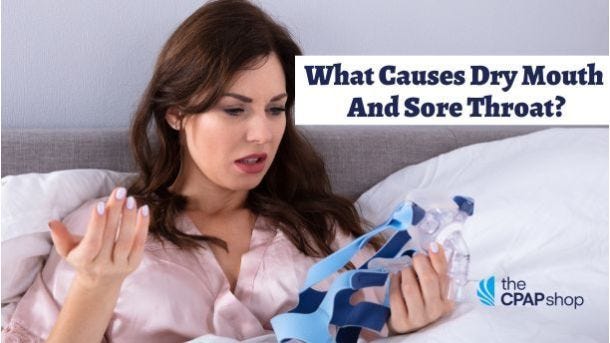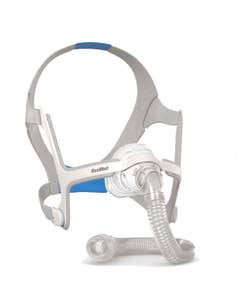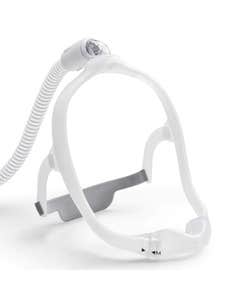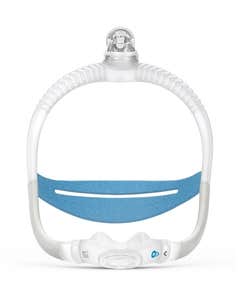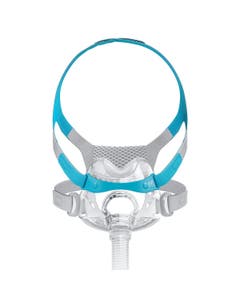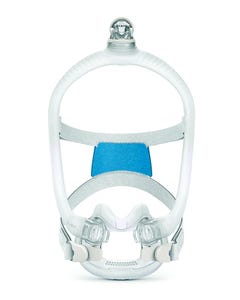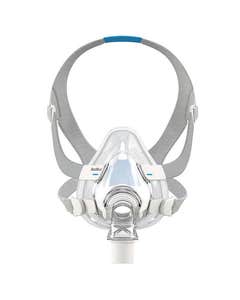What Causes Dry Mouth And Sore Throat?
This post was originally posted on May 5, 2020, and updated on July 15, 2022.
While are there many health benefits to staying CPAP compliant, including better sleep, there may also be some side effects with CPAP therapy. It is not uncommon for CPAP patients to experience dry mouth or a sore throat in the morning after a night of CPAP therapy, especially if they use their CPAP machine every night. Fortunately, there are solutions to help reduce these side effects so you can continue CPAP therapy effectively and comfortably.
How to Eliminate Dry Mouth from CPAP
Dry mouth and its impact on a good night’s sleep tends to be a common issue for some CPAP users. A dry mouth or throat leads to various nasal problems such as congestion and soreness, so it is imperative that any CPAP user understand the causes and remedies to help alleviate this issue.
Are you Waking up with Dry Mouth While Using CPAP?
If you are waking up with dry mouth while using CPAP then air leakage may be occurring around your mask. The leak causes moisture to escape and leave your mouth parched. Nasal and nasal pillow masks are the types of mask that most commonly cause dry mouth.
Why CPAP Causes Dry Mouth
Dry mouth is a normal occurrence for people who just start out on CPAP therapy simply because they are not used to the pressurized air required to help open the air passage. Dry mouth is exacerbated for people whose jaw drops open during sleep. Not only does this create a much less efficient therapy because of leakage, it also causes dry mouth.
Causes of Dry Mouth
Cause 1: Medications or Other Conditions
Dry mouth may not only relate to a person’s use of CPAP. Some medical conditions may already produce dry mouth including diabetes, stroke, yeast infection (thrush) in your mouth or an autoimmune disease such as Sjogren's syndrome or HIV/AIDS.
Medications you are prescribed may also have dry mouth as a side effect. Hundreds of medications, including many over-the-counter drugs, produce dry mouth in some patients. Among the more likely types to cause problems are some of the drugs used to treat depression, high blood pressure and anxiety, as well as some antihistamines, decongestants, muscle relaxants and pain medications.
Cause 2: Non-heated Air
The pressurized air from a CPAP machine is typically cool and dry. Regular use of CPAP can dry out the mouth, especially if you are someone who sleeps with their mouth open. You can use heated tubing to warm the air that passes from the CPAP machine into your mask. Warm air is moist, so you do not experience dry mouth in the morning.
Some CPAP machines also come with heated humidifiers that can provide warm, moist air for CPAP therapy. Selecting one of these CPAP machines or adding a heated humidifier to the machine can help reduce dry mouth during CPAP therapy.
Cause 3: Severe Mask Leak
A leaking CPAP mask can also cause dry mouth. Mask leak is a leading reason why 45% of former CPAP users quit their therapy. The reason for severe CPAP mask leaks can be a poorly-fitting mask. If the mask does not fit well, it can start to leak. If you find yourself tightening the mask to prevent leaks, then it may be time for a different mask.
The type of mask you select can also be helpful for preventing dry mouth. A full-face CPAP mask covers the mouth and nose completely and can help reduce dry mouth. Never adapt to a mask that is uncomfortable.
Causes Of Sore Throat
Air Is Leaking from Your CPAP Mask
Like dry mouth, the culprit for a morning sore throat may be your CPAP mask. Some older masks begin to lose their effective seal and may leak, which can cause dryness in the air you breath on a nightly basis and leave you with a sore throat when you wake up.
Replace old masks that are uncomfortable or require constant tightening. These are the first signs you need a new mask. You may also want to try different types of CPAP mask for more effectiveness. Full-face CPAP masks can help reduce sore throats and may be a solution if sore throats happen frequently after CPAP therapy.
Airflow Is Either Too Dry or Too Cold
The airflow from CPAP machines can be dry and cold, which can leave you with a sore throat in the morning. Look to adding heated tubing to your equipment setup. Warm tubing creates warm air before it reaches your mask and can help prevent the dryness that causes sore throats.
Humidifiers and heated humidifiers can be included in your CPAP therapy. Moistening air helps reduce sore throats and heated warm air from heated humidifiers provides both warm and moist air for therapy so you can breathe comfortably.
Some CPAP machines already have humidifiers or heated humidifiers built-in. You can add an optional humidifier to your CPAP machine if you currently have a standard CPAP and start to experience sore throats.
Pressure of Air Might Be Too High
Be sure your CPAP machine is set to the precise pressure prescribed by your doctor. Altering the pressure setting, especially adjusting to a higher setting can cause sore throats. If you are prescribed a higher pressure setting, you can talk to your doctor about adjusting to a lower pressure because of the sore throat side effect.
If your doctor insists that you need a higher pressure setting, you can turn to humidifiers. They attach to your CPAP machine. You can also use heated tubing to help modify the air you breathe so you can keep your pressure setting without the occurrence of sore throats.
Upper Airway Infection or Sinus Infection
Sometimes your CPAP machine may not be to blame for your morning sore throat. If you have an upper airway infection or sinus infection, you may experience the symptom of a sore throat. During any period of respiratory sickness, it is best to set your CPAP therapy aside until you feel better. CPAP therapy can make a current infection worse.
Take time away from CPAP therapy and treat your infection either with over-the-counter medications or for more severe infections, prescribed medications from your doctor. Once your infection clears up, you should not experience sore throats once you resume CPAP therapy.
CPAP Dry Mouth Solutions
Wear Nasal Mask
There are a couple of solutions to help prevent this type of problem. If you wear a nasal or nasal pillow mask, a simple solution would be to wear a chinstrap which essentially holds the jaw in place. Holding the jaw shut will not only help the effectiveness of therapy, but it will also combat the causes of dry mouth.
Switching to Full Face Mask
A second solution would be a switch to a full face mask, which covers both the nose and mouth. Although for some, wearing a full face mask could be a bit claustrophobic or confining, it is a great solution to alleviate dry mouth. In fact, you do not have to wear your full face every day. Switching between tasks can be an effective solution.
Consider Using Humidifiers
The most effective and comfortable solution to dry mouth is to use a humidifier, either heated or at room temperature, with your CPAP machine. Nearly all new CPAP machines have integrated humidifiers. In fact, all of the best-selling auto CPAP machines have either an integrated or optional attachable humidifier. We have compared the best-selling CPAP machines of 2020.
Humidification is key when dealing with symptoms of dry mouth because the humidifier can supply both warm and room temperate air. At The CPAP Shop, we always recommend using the humidifier to add even a small amount of humidity to the airflow. This will help nasal passages to stay hydrated. Hydrated breathing passages will help to combat colds, congestion, and sore throat.
Check for Mask Leaks
If you are using both a full face mask and a CPAP machine with a heated humidifier and still experiencing dry mouth, the mask may be leaking. An ill-fitted CPAP mask – whether not sized properly, the wrong style, a degraded cushion, or poor headgear adjustment – can cause air leaks. If leakage occurs, dry air from the room can leak in while humidification escapes. The result is reduced humidification within the circuit, resulting in dry throat and mouth. Many machines have a mask leak alert to help you troubleshoot this problem. Check the data within your machine to confirm a mask leak.
Avoid Dehydration
Finally, beyond factors involving the CPAP machine and mask, dry mouth can also get worse from dehydration. The general recommendation to drink eight 8 oz. glasses of water a day might be too little for many people. When people drink large amounts of coffee or other caffeine beverages or even sweat a lot during the day, their need for water may increase. Making sure to rehydrate is an important part of CPAP therapy.
CPAP Sore Throat Solutions
Consider Checking Your CPAP Mask Fittings
Many occurrences of CPAP sore throat can be resolved with your CPAP mask. An ill-fitting mask can leak which can lead to sore throats. Check your mask fittings. Use the fitting guide provided with the mask to ensure you have made the proper adjustments. You should never have to overtighten your mask to secure a seal. Many CPAP patients try different CPAP masks until they find the one that works best for them.
If you find yourself adapting to an uncomfortable mask, you might consider replacing it for a new one. Seals wear out and masks become less effective over time and occasionally need to be replaced.
Consider Using a Humidifier
The dry air of CPAP machines can also cause sore throats in the morning. You may be able to find a CPAP machine with a humidifier built-in. You can also add a humidifier to your current CPAP machine. Moist, warm air helps soothe the airway during CPAP therapy and helps prevent sore throats.
You can also consider a heated humidifier which provides both warm and moist air for added comfort.
Be sure to keep your humidifier clean, especially the water chamber and tubing. An unclean humidifier can be a breeding ground for germs which can lead to sinus and upper airway infections, which can cause a sore throat.
Consider Trying A CPAP Chin Strap
One of the most common causes of sore throat during CPAP therapy is an open mouth. Mouth breathers may experience sore throats more often than patients who can conduct CPAP therapy with their mouth closed. An open mouth allows the moisture in your mouth to dry up, which can lead to a sore throat.
A CPAP chin strap helps mouth breathers keep their mouth closed during therapy, which allows your mouth to maintain its naturally warm, moist environment and prevent sore throats.
Like a CPAP mask, look for a CPAP chin strap that can be adjusted and fits properly without discomfort.
Warm the Airflow
Keeping the airflow from your CPAP machine also helps prevent sore throats. Use heated tubing to turn the cool air from your CPAP machine into warm, soothing air when it reaches your mask. You can also select a heated humidifier to generate warm, moist air. Typically, the air from CPAP machines is cool, which may not affect every patient. Some patients who may be mouth breathers or have other factors that contribute to frequent sore throats, can rely on warmer airflow as a solution.
Be sure to keep your heated humidifier and tubing clean. Humidifiers and tubing can breed germs that can cause many infections that lead to sore throats. A thorough and effective cleaning and sanitizing schedule ensures healthy CPAP therapy free of side effects.
Adjust the Air Pressure Settings
Higher pressure settings on your CPAP machine may also lead to a sore throat. Do not adjust your pressure settings without first consulting with your doctor. Some patients require higher pressure settings to effectively manage their obstructive sleep apnea. IF you require a higher pressure setting, you may need to seek out alternatives for reducing sore throat including humidifiers, heated tubing, or different types of CPAP masks. If you can lower your pressure setting without compromising your CPAP therapy, then you may be able to reduce instances of sore throat. BiPAP machines and auto CPAP machines can automatically adjust settings based on your breathing patterns while helping you stay CPAP compliant. These types of machines may be helpful options for someone suffering from frequent sore throats the mornings after CPAP therapy.
Key Takeaways
While there are reported occasional side effects to CPAP therapy, the overall benefits outweigh the possible issues patients face. There are many solutions CPAP patients can turn do to reduce sore throat and dry mouth. Some patients may abandon CPAP therapy altogether because of these issues. But CPAP plays a vital role in supporting sleep health. Patients should look to the many options available to reduce side effects so that they can continue healthy and comfortable CPAP therapy.
While are there many health benefits to staying CPAP compliant, including better sleep, there may also be some side effects with CPAP therapy. It is not uncommon for CPAP patients to experience dry mouth or a sore throat in the morning after a night of CPAP therapy, especially if they use their CPAP machine every night. Fortunately, there are solutions to help reduce these side effects so you can continue CPAP therapy effectively and comfortably.
How to Eliminate Dry Mouth from CPAP
Dry mouth and its impact on a good night’s sleep tends to be a common issue for some CPAP users. A dry mouth or throat leads to various nasal problems such as congestion and soreness, so it is imperative that any CPAP user understand the causes and remedies to help alleviate this issue.
Are You Waking up with Dry Mouth While Using CPAP?
If you are waking up with dry mouth while using CPAP then air leakage may be occurring around your mask. The leak causes moisture to escape and leave your mouth parched. Nasal and nasal pillow masks are the types of mask that most commonly cause dry mouth.
Why CPAP Causes Dry Mouth
Dry mouth is a normal occurrence for people who just start out on CPAP therapy simply because they are not used to the pressurized air required to help open the air passage. Dry mouth is exacerbated for people whose jaw drops open during sleep. Not only does this create a much less efficient therapy because of leakage, it also causes dry mouth.
Causes of Dry Mouth
Cause 1: Medications or Other Conditions
Dry mouth may not only relate to a person’s use of CPAP. Some medical conditions may already produce dry mouth including diabetes, stroke, yeast infection (thrush) in your mouth or an autoimmune disease such as Sjogren's syndrome or HIV/AIDS.
Medications you are prescribed may also have dry mouth as a side effect. Hundreds of medications, including many over-the-counter drugs, produce dry mouth in some patients. Among the more likely types to cause problems are some of the drugs used to treat depression, high blood pressure and anxiety, as well as some antihistamines, decongestants, muscle relaxants and pain medications.
Cause 2: Non-heated Air
The pressurized air from a CPAP machine is typically cool and dry. Regular use of CPAP can dry out the mouth, especially if you are someone who sleeps with their mouth open. You can use heated tubing to warm the air that passes from the CPAP machine into your mask. Warm air is moist, so you do not experience dry mouth in the morning.
Some CPAP machines also come with heated humidifiers that can provide warm, moist air for CPAP therapy. Selecting one of these CPAP machines or adding a heated humidifier to the machine can help reduce dry mouth during CPAP therapy.
Cause 3: Severe Mask Leak
A leaking CPAP mask can also cause dry mouth. Mask leak is a leading reason why 45% of former CPAP users quit their therapy. The reason for severe CPAP mask leaks can be a poorly-fitting mask. If the mask does not fit well, it can start to leak. If you find yourself tightening the mask to prevent leaks, then it may be time for a different mask.
The type of mask you select can also be helpful for preventing dry mouth. A full-face CPAP mask covers the mouth and nose completely and can help reduce dry mouth. Never adapt to a mask that is uncomfortable.
Causes Of Sore Throat
Air Is Leaking from Your CPAP Mask
Like dry mouth, the culprit for a morning sore throat may be your CPAP mask. Some older masks begin to lose their effective seal and may leak, which can cause dryness in the air you breath on a nightly basis and leave you with a sore throat when you wake up.
Replace old masks that are uncomfortable or require constant tightening. These are the first signs you need a new mask. You may also want to try different types of CPAP mask for more effectiveness. Full-face CPAP masks can help reduce sore throats and may be a solution if sore throats happen frequently after CPAP therapy.
Airflow Is Either Too Dry or Too Cold
The airflow from CPAP machines can be dry and cold, which can leave you with a sore throat in the morning. Look to adding heated tubing to your equipment setup. Warm tubing creates warm air before it reaches your mask and can help prevent the dryness that causes sore throats.
Humidifiers and heated humidifiers can be included in your CPAP therapy. Moistening air helps reduce sore throats and heated warm air from heated humidifiers provides both warm and moist air for therapy so you can breathe comfortably.
Some CPAP machines already have humidifiers or heated humidifiers built-in. You can add an optional humidifier to your CPAP machine if you currently have a standard CPAP and start to experience sore throats.
Pressure of Air Might Be Too High
Be sure your CPAP machine is set to the precise pressure prescribed by your doctor. Altering the pressure setting, especially adjusting to a higher setting can cause sore throats. If you are prescribed a higher pressure setting, you can talk to your doctor about adjusting to a lower pressure because of the sore throat side effect.
If your doctor insists that you need a higher pressure setting, you can turn to humidifiers. They attach to your CPAP machine. You can also use heated tubing to help modify the air you breathe so you can keep your pressure setting without the occurrence of sore throats.
Upper Airway Infection or Sinus Infection
Sometimes your CPAP machine may not be to blame for your morning sore throat. If you have an upper airway infection or sinus infection, you may experience the symptom of a sore throat. During any period of respiratory sickness, it is best to set your CPAP therapy aside until you feel better. CPAP therapy can make a current infection worse.
Take time away from CPAP therapy and treat your infection either with over-the-counter medications or for more severe infections, prescribed medications from your doctor. Once your infection clears up, you should not experience sore throats once you resume CPAP therapy.
CPAP Dry Mouth Solutions
Wear a Nasal Mask
There are a couple of solutions to help prevent this type of problem. If you wear a nasal or nasal pillow mask, only your nose will be covered rather than both your nose and mouth. Additionally, a simple solution would be to add a chinstrap which essentially holds the jaw in place. Holding the jaw shut will not only help the effectiveness of therapy, but it will also combat the causes of dry mouth.
Nasal Mask Options
The ResMed AirFit N20 Nasal CPAP Mask is a best-selling mask because of its sleek design, comfortable fit, and effective performance. It offers a reliable seal that will stay in place all night and a lightweight feel and fit that reduces facial marks and also provides a clear line of vision.
The Philips Respironics DreamWear Nasal CPAP Mask stands out amongst its competitors because of its innovative, sleek design and fit. This mask lets CPAP patients sleep in any position they would like without breaking the seal or causing skin irritation, soreness, or red marks on the face.
The ResMed AirFit N30i Nasal CPAP Mask features a top-of-the-head tubing connection that allows patients to move around freely at night. It also has contoured cushions to enhance comfort and reliability. One of its most notable features is the QuietAir Vent Technology which works to gently spread out and diffuse air coming from the mask, reducing noise levels.
Switch to a Full Face Mask
A second solution would be a switch to a full face mask, which covers both the nose and mouth. Although for some, wearing a full face mask could be a bit claustrophobic or confining, it is a great solution to alleviate dry mouth. In fact, you do not have to wear your full face every day. Switching between tasks can be an effective solution.
Full Face Mask Options
The Fisher & Paykel Evora Full Face CPAP Mask is a lightweight and minimally designed mask to provide users with all the benefits of a full face mask without bulkiness. Patients have a clear line of vision when wearing this mask, can sleep comfortably thanks to the integrated VentiCool technology, and also have the freedom to sleep in whatever position works best for them.
The ResMed AirFit F30i Full Face CPAP Mask includes a 360-degree swivel and top-of-the-head tubing connection and a hollow frame, allowing air to flow through the frame to create a more complete seal. The UltraCompact cushion reduces irritation and red marks on the face for a comfortable treatment all night long.
The ResMed AirFit F20 Full Face CPAP Mask is a very universal mask that accommodates many different face shapes and sizes. It includes InfinitySeal cushions that can fit almost anyone, utilizing 7 contours and comfort points and adaptive wings to properly fit and remain secure on many different faces.
Consider Using a Humidifer
The most effective and comfortable solution to dry mouth is to use a humidifier, either heated or at room temperature, with your CPAP machine. Nearly all new CPAP machines have integrated humidifiers. In fact, all of the best-selling auto CPAP machines have either an integrated or optional attachable humidifier. We have compared the best-selling CPAP machines of 2020.
Humidification is key when dealing with symptoms of dry mouth because the humidifier can supply both warm and room-temperate air. At The CPAP Shop, we always recommend using the humidifier to add even a small amount of humidity to the airflow. This will help nasal passages to stay hydrated. Hydrated breathing passages will help to combat colds, congestion, and sore throat.
Check for Mask Leaks
If you are using both a full face mask and a CPAP machine with a heated humidifier and still experiencing dry mouth, the mask may be leaking. An ill-fitted CPAP mask – whether not sized properly, the wrong style, a degraded cushion, or poor headgear adjustment – can cause air leaks. If leakage occurs, dry air from the room can leak in while humidification escapes. The result is reduced humidification within the circuit, resulting in dry throat and mouth. Many machines have a mask leak alert to help you troubleshoot this problem. Check the data within your machine to confirm a mask leak.
Avoid Dehydration
Finally, beyond factors involving the CPAP machine and mask, dry mouth can also get worse from dehydration. The general recommendation to drink eight 8 oz. glasses of water a day might be too little for many people. When people drink large amounts of coffee or other caffeine beverages or even sweat a lot during the day, their need for water may increase. Making sure to rehydrate is an important part of CPAP therapy.
CPAP Sore Throat Solutions
Consider Checking Your CPAP Mask Fittings
Many occurrences of CPAP sore throat can be resolved with your CPAP mask. An ill-fitting mask can leak which can lead to sore throats. Check your mask fittings. Use the fitting guide provided with the mask to ensure you have made the proper adjustments. You should never have to overtighten your mask to secure a seal. Many CPAP patients try different CPAP masks until they find the one that works best for them.
If you find yourself adapting to an uncomfortable mask, you might consider replacing it for a new one. Seals wear out and masks become less effective over time and occasionally need to be replaced.
Consider Using a Humidifier
The dry air of CPAP machines can also cause sore throats in the morning. You may be able to find a CPAP machine with a humidifier built-in. You can also add a humidifier to your current CPAP machine. Moist, warm air helps soothe the airway during CPAP therapy and helps prevent sore throats.
You can also consider a heated humidifier which provides both warm and moist air for added comfort.
Be sure to keep your humidifier clean, especially the water chamber and tubing. An unclean humidifier can be a breeding ground for germs which can lead to sinus and upper airway infections, which can cause a sore throat.
Consider Trying A CPAP Chin Strap
One of the most common causes of sore throat during CPAP therapy is an open mouth. Mouth breathers may experience sore throats more often than patients who can conduct CPAP therapy with their mouth closed. An open mouth allows the moisture in your mouth to dry up, which can lead to a sore throat.
A CPAP chin strap helps mouth breathers keep their mouth closed during therapy, which allows your mouth to maintain its naturally warm, moist environment and prevent sore throats.
Like a CPAP mask, look for a CPAP chin strap that can be adjusted and fits properly without discomfort.
Warm the Airflow
Keeping the airflow from your CPAP machine also helps prevent sore throats. Use heated tubing to turn the cool air from your CPAP machine into warm, soothing air when it reaches your mask. You can also select a heated humidifier to generate warm, moist air. Typically, the air from CPAP machines is cool, which may not affect every patient. Some patients who may be mouth breathers or have other factors that contribute to frequent sore throats, can rely on warmer airflow as a solution.
Be sure to keep your heated humidifier and tubing clean. Humidifiers and tubing can breed germs that can cause many infections that lead to sore throats. A thorough and effective cleaning and sanitizing schedule ensures healthy CPAP therapy free of side effects
Adjust the Air Pressure Settings
Higher pressure settings on your CPAP machine may also lead to a sore throat. Do not adjust your pressure settings without first consulting with your doctor. Some patients require higher pressure settings to effectively manage their obstructive sleep apnea. IF you require a higher pressure setting, you may need to seek out alternatives for reducing sore throat including humidifiers, heated tubing, or different types of CPAP masks. If you can lower your pressure setting without compromising your CPAP therapy, then you may be able to reduce instances of sore throat. BiPAP machines and auto CPAP machines can automatically adjust settings based on your breathing patterns while helping you stay CPAP compliant. These types of machines may be helpful options for someone suffering from frequent sore throats the mornings after CPAP therapy.
Key Takeaways
While occasional side effects to CPAP therapy are reported, the overall benefits outweigh the possible issues patients face. There are many solutions CPAP patients can turn do to reduce sore throat and dry mouth. Some patients may abandon CPAP therapy altogether because of these issues. Howeverm CPAP plays a vital role in supporting sleep health. Patients should look to the many options available to reduce side effects so that they can continue healthy and comfortable CPAP therapy.
If you are looking for CPAP therapy equipment, The CPAP Shop would be happy to help! We offer hundreds of the highest quality CPAP products for comfortable and compliant CPAP treatment. Search our website or give our knowledgeable team a call at 866-414-9700 today!
This post was originally posted on May 5, 2020, and updated on January 11, 2024.



